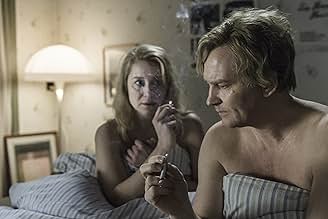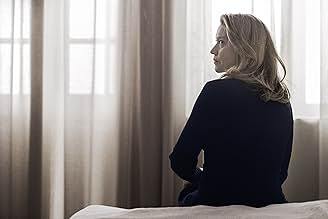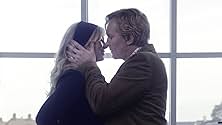IMDb-BEWERTUNG
6,4/10
8553
IHRE BEWERTUNG
Eine Geschichte über den Konflikt zwischen persönlichen Wünschen und der Solidarität und Toleranz in einer dänischen Kommune in den 1970ern.Eine Geschichte über den Konflikt zwischen persönlichen Wünschen und der Solidarität und Toleranz in einer dänischen Kommune in den 1970ern.Eine Geschichte über den Konflikt zwischen persönlichen Wünschen und der Solidarität und Toleranz in einer dänischen Kommune in den 1970ern.
- Auszeichnungen
- 6 Gewinne & 21 Nominierungen insgesamt
Empfohlene Bewertungen
Vinterberg, understandably having grown up in a commune, doesn't properly establish the hippy commune lifestyle. Probably because to him, that's just what he grew up with. He assumes you already know (and I do) but most people don't (or haven't thought about it) so the film feels severely lacking in world building. If this movie were an essay the first paragraph with the hypothesis is missing. Tell us a little bit about the ideology behind the choice in lifestyle; you did it beautifully did with Druk! Without it, the dramatic, emotional and ideological arithmetic doesn't quite add up. Have Ole tells us a bit about his left wing literature! Not to mention, Vinterberg shares nothing of the drug culture that the hippy lifestyle so adamantly relies on. Squash any human instinct/desire with a physical simulation; that's the hippy way. Feel unhappy: drink. You don't get that spark from learning something new? Just take a smoke and you'll get that spark relearning things you already know. Everything is material for the hippy, everything superficial. Real emotions always denied because we have pills for that! This film severely lacked a proper set up of that world in the first half.
That being said, this film develops into a deeply pertinent and important message. He perfectly diagnoses the problems with a hippy approach to a family structure. And I know this because my own family was a victim of this way of life. The mom in the film is my mom. The dad is my dad. The people in the film are from 70s Denmark, and my parents are from 90s LA. And while we live miles apart, the way of thinking leads to the same outcomes, and I have to repeat: Vinterberg perfectly diagnoses the problem with this type of thinking. While the woman may be the one suggesting a free love lifestyle, it's ultimately the women who will always suffer. The patriarch is to blame because he is the leader, whether or not he rhetorically offloads his duty to others.
The institution of marriage protects women, as their prospects of love virtually become null and void once they become old and ugly. The man however can remarry. This is why marriage exists. My parents were stupid enough to never make this observation and like in the movie, my mom ended up hooked on pills and alcohol while my father ran off with his tight new muse. And if you think the corporate world has any interest in supporting old women, think again.
That being said, this film develops into a deeply pertinent and important message. He perfectly diagnoses the problems with a hippy approach to a family structure. And I know this because my own family was a victim of this way of life. The mom in the film is my mom. The dad is my dad. The people in the film are from 70s Denmark, and my parents are from 90s LA. And while we live miles apart, the way of thinking leads to the same outcomes, and I have to repeat: Vinterberg perfectly diagnoses the problem with this type of thinking. While the woman may be the one suggesting a free love lifestyle, it's ultimately the women who will always suffer. The patriarch is to blame because he is the leader, whether or not he rhetorically offloads his duty to others.
The institution of marriage protects women, as their prospects of love virtually become null and void once they become old and ugly. The man however can remarry. This is why marriage exists. My parents were stupid enough to never make this observation and like in the movie, my mom ended up hooked on pills and alcohol while my father ran off with his tight new muse. And if you think the corporate world has any interest in supporting old women, think again.
Kollektivet (original title) or The Commune (English title), the new movie from director Thomas Vinterberg (known for Festen - The Celebration - 1998, Submarine - 2010 and Jagten - The Hunt - 2013), one of the founders of the film movement Dogme 95, which seeks to create a more realistic and less commercial cinema, deals with a family in the 70s, formed by the father Erik (played by Ulrich Thomsen, known for Festen - The Celebration - 1998 and Adams æbler - Adam's Apples - 2005), the mother Anna (represented by Trine Dyrholm, known for Festen - The Celebration - 1998 and DeUsynlige - Troubled Water - 2008) and the daughter Freja (played by Martha Hansen). Erik inherits the house of his family after the death of his father, but considering it very large and with high maintenance costs he is willing to sell it. However, his wife convinces him to turn the house into a kind of community, inviting some friends and even interviewing strangers to share the house and to help pay the bills. Living in a group, like a big family, they have dinners, parties and regular meetings so that important matters are made democratically. But the utopia around this experiment begins to be questioned when a love affair shakes the small community.
Kollektivet hits to portray very well the time when the story takes place: the 70s in Copenhagen. The production design, costumes and characters's characterization, expressed by the clothes, hair and costumes, confer credibility and immerse the viewer in the plot. But the film errs for not develop enough the characters that are not part of the central plot. The director should have further explored the group in conflict scenes and the writer could have better elaborated the difficulties of social life that are inherent to a life in a community. As it was written the supporting actors add little to the story and the parallel plot of Freja's journey into adulthood opposed to the reflection of everything that happens within the community deserved to be better developed.
The big highlight is the actress Trine Dyrholm, who received the Silver Bear for Best Actress at the Berlin Film Festival this year for her excellent performance. The most dramatic scenes and the strongest blows that we took in the feature film are starred by her character, Anna, a television news presenter. The actress representation convinces not only because her ability to express emotions in times of joy or in the darkest moments, but by the naturalness of interpretation, which makes the viewer forget that it's just a role play.
Convivial challenges can be overcome? To what extent a community project should override the individual interests? What is more important: the individual or the collective? Life in community is possible? These are some of the questions that The Commune tries to address, but ends up doing superficially. Director Thomas Vinterberg had talent to produce a film with a final result much better than he produced.
Originally posted in: https://vikingbyheart.blogspot.com.br
Kollektivet hits to portray very well the time when the story takes place: the 70s in Copenhagen. The production design, costumes and characters's characterization, expressed by the clothes, hair and costumes, confer credibility and immerse the viewer in the plot. But the film errs for not develop enough the characters that are not part of the central plot. The director should have further explored the group in conflict scenes and the writer could have better elaborated the difficulties of social life that are inherent to a life in a community. As it was written the supporting actors add little to the story and the parallel plot of Freja's journey into adulthood opposed to the reflection of everything that happens within the community deserved to be better developed.
The big highlight is the actress Trine Dyrholm, who received the Silver Bear for Best Actress at the Berlin Film Festival this year for her excellent performance. The most dramatic scenes and the strongest blows that we took in the feature film are starred by her character, Anna, a television news presenter. The actress representation convinces not only because her ability to express emotions in times of joy or in the darkest moments, but by the naturalness of interpretation, which makes the viewer forget that it's just a role play.
Convivial challenges can be overcome? To what extent a community project should override the individual interests? What is more important: the individual or the collective? Life in community is possible? These are some of the questions that The Commune tries to address, but ends up doing superficially. Director Thomas Vinterberg had talent to produce a film with a final result much better than he produced.
Originally posted in: https://vikingbyheart.blogspot.com.br
"The Commune" at the center of Thomas Vinterberg's film isn't typical of the communes I knew back in the day. For a start, the members of this one are reasonably well off and are mostly middle-aged and, of course, they bring to this 'living together' thing all the baggage you would expect. Things come to a head when commune founder Erik, (Ulrich Thomsen), falls for one of his students and moves her in leading his wife Anna, (Trine Dyrholm), to have a nervous breakdown.
Vinterberg's film began life as a play and it's certainly very theatrical but despite the emotional conflicts at the film's heart, it's also fairly conventional with everyone other than Erik and Anna fading very much into the background. You never get to know any of them. Subplots come and go and it just trudges on. On the plus side, it's very well acted particularly by Dyrholm who won the Best Actress prize at Berlin; she's the only one you actually care about. It might have worked better on stage where at least you could feel 'in the same place' as these commune-dwellers. On screen, it just feels like another piece of Vinterberg navel-gazing.
Vinterberg's film began life as a play and it's certainly very theatrical but despite the emotional conflicts at the film's heart, it's also fairly conventional with everyone other than Erik and Anna fading very much into the background. You never get to know any of them. Subplots come and go and it just trudges on. On the plus side, it's very well acted particularly by Dyrholm who won the Best Actress prize at Berlin; she's the only one you actually care about. It might have worked better on stage where at least you could feel 'in the same place' as these commune-dwellers. On screen, it just feels like another piece of Vinterberg navel-gazing.
A middle class Danish couple find that they have inherited a rather grand house on the death of Erik's father. It is going to be too big for them and their only daughter and more over too hard to finance and so Anna suggests they invite a few others to live with them and for a 'Kollektivet' or as we would call it a commune.
They waste little to no time in getting an assorted array of waifs and not so strays and soon fine that communal living bring challenges and opportunities in equal measure. Not all of them are going to be easy to grasp and the tensions, that go hand in hand with any social experiment, waste no time in pushing their way to the fore.
Now I really liked this, I loved the idea of a commune having spent time in one in the eighties (when they were a bit passé to be honest) and the themes are explored here but also the lives of the main characters are mostly to the fore. This is Anna played brilliantly by Trine Dryholm – 'The Legacy' and her husband Erik (Ulrich Thomsen – 'The Blacklist') and their young daughter who is growing up much too quickly. His is from director Thomas Vinterberg who brought us 'The Hunt' in 2012 and 'The Celebration' in 1998 and I think he has an eye for style but sometimes struggles to engage, but here I think he has melded all parts of the art very well together to bring a very entertaining watch – recommended.
They waste little to no time in getting an assorted array of waifs and not so strays and soon fine that communal living bring challenges and opportunities in equal measure. Not all of them are going to be easy to grasp and the tensions, that go hand in hand with any social experiment, waste no time in pushing their way to the fore.
Now I really liked this, I loved the idea of a commune having spent time in one in the eighties (when they were a bit passé to be honest) and the themes are explored here but also the lives of the main characters are mostly to the fore. This is Anna played brilliantly by Trine Dryholm – 'The Legacy' and her husband Erik (Ulrich Thomsen – 'The Blacklist') and their young daughter who is growing up much too quickly. His is from director Thomas Vinterberg who brought us 'The Hunt' in 2012 and 'The Celebration' in 1998 and I think he has an eye for style but sometimes struggles to engage, but here I think he has melded all parts of the art very well together to bring a very entertaining watch – recommended.
This is quite a slow burner, plot pace wise. Its mostly about family dynamics and trust. It took a while for me to feel especially interested in the characters but I thought it was somewhat of a powerful watch by the time it headed towards the end and I would say it may make you think.
If your not keen on character focussed dramas then this won't be for you. Also of course you likely have to rely on the subtitles, as its in Danish, although I was pleased to see that the subtitles were quite large in terms of text size, compared to other films with smaller subtitles, so if anything it was slightly less of an issue than it might have been. I felt sorry for the wife Anna and I did find myself wondering what might happen next, as things moved on plot wise but it is, as I say, a relatively slow burner, so don't expect fast paced action or anything of that sort. Its a reasonably intriguing watch and overall I suppose I'd say its a good watch, hence my rating.
If your not keen on character focussed dramas then this won't be for you. Also of course you likely have to rely on the subtitles, as its in Danish, although I was pleased to see that the subtitles were quite large in terms of text size, compared to other films with smaller subtitles, so if anything it was slightly less of an issue than it might have been. I felt sorry for the wife Anna and I did find myself wondering what might happen next, as things moved on plot wise but it is, as I say, a relatively slow burner, so don't expect fast paced action or anything of that sort. Its a reasonably intriguing watch and overall I suppose I'd say its a good watch, hence my rating.
Wusstest du schon
- WissenswertesThe film is based on Thomas Vinterberg's play of the same name, which is inspired by his colourful childhood in an academic commune north of Copenhagen.
- PatzerThe signs on the bus stops were not introduced until the late 80's or 90's.
Top-Auswahl
Melde dich zum Bewerten an und greife auf die Watchlist für personalisierte Empfehlungen zu.
- How long is The Commune?Powered by Alexa
Details
- Erscheinungsdatum
- Herkunftsländer
- Offizielle Standorte
- Sprache
- Auch bekannt als
- The Commune
- Drehorte
- Hellerup, Sjælland, Dänemark(location)
- Produktionsfirmen
- Weitere beteiligte Unternehmen bei IMDbPro anzeigen
Box Office
- Bruttoertrag in den USA und Kanada
- 38.737 $
- Eröffnungswochenende in den USA und in Kanada
- 9.249 $
- 21. Mai 2017
- Weltweiter Bruttoertrag
- 4.410.339 $
- Laufzeit
- 1 Std. 51 Min.(111 min)
- Farbe
- Sound-Mix
- Seitenverhältnis
- 2.35 : 1
Zu dieser Seite beitragen
Bearbeitung vorschlagen oder fehlenden Inhalt hinzufügen




























